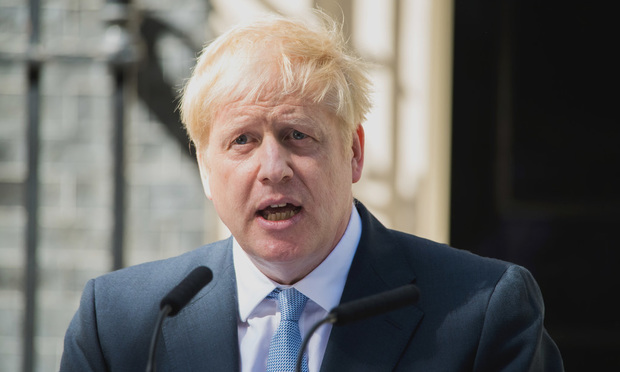UK's Surprise Exit Casts 'Deep Shadow' Over Unified EU Patent Court
"A 'setback' is probably an understatement at the end of the day," said Morrison & Foerster partner Otis Littlefield of the move. "I think that could be the end of this system."
February 28, 2020 at 06:47 PM
4 minute read
 Boris Johnson, U.K. prime minister, delivers a speech outside 10 Downing Street.
Boris Johnson, U.K. prime minister, delivers a speech outside 10 Downing Street.The United Kingdom's decision to pull out from the project for a unified European patent court is a setback that could sound the death knell for the star-crossed project.
"A 'setback' is probably an understatement at the end of the day," said Morrison & Foerster partner Otis Littlefield, whose remit includes managing global patent strategy for life sciences companies. "I think that could be the end of this system."
European nations have been trying to put together a unified patent court for some 40 years. The project gained steam several years ago when 25 of the then-27 EU member states supported a Unified Patent Court (UPC) that would have exclusive jurisdiction over unitary patents, including infringement and validity proceedings. The agreement provided that at least 13 member states would have to ratify, including at minimum France, Germany and the U.K.
Following the U.K.'s Brexit vote in 2016, the administration of Prime Minister Theresa May indicated that the country would remain in the project, even though UPC decisions would be appealable to the Court of Justice of the European Union. But the government of new Prime Minister Boris Johnson announced Friday that that provision is a deal-breaker.
German ratification of the project is still subject to a court challenge that is expected to be resolved later this year. But even if that hurdle is overcome, the withdrawal of the U.K. may prove insurmountable, Littlefield said.
"The UPC agreement specifies in writing that London is going to be one the central courts" in the unified patent system, Littlefield said. So at a minimum the framework would have to be renegotiated or amended. Plus, if one of the top three issuers of patents in Europe is removed, "then you've lost a lot of the value of a unitary patent court system."
He said it's possible the remaining EU participants might still try to put together a unified court. But "I just wonder if there's still a desire to do a full unitary patent court system."
Jonathan Radcliffe, a London-based Reed Smith partner, agreed that the U.K. pullout casts "a dark shadow" over the project. "As Europe's second largest economy and one of its leading patent countries, the U.K.'s withdrawal will unarguably make the UPC of less commercial interest to many potential users," he said via email, noting that Spain, Poland and Croatia have already said they won't be joining.
Radcliffe also called it a de facto strategic power play by Johnson. "By rejecting UPC participation and its EU law oversight, any company that needs to defend its patents across Europe will now have to litigate in the U.K. even if the UPC system comes into being."
Not everyone thinks the Unified Patent Court is doomed though. Jin Ooi, a partner in Kirkland & Ellis' U.K. IP litigation practice, said he sees only a slim possibility that the project won't go forward without the U.K.
"The UP/UPC has been in plan for decades now, and to abandon the project whilst it is now so close to the finishing line is almost unthinkable," he said via email. "The likelihood is that it will proceed without the U.K.'s involvement, regrettable though that may be. Of course, there are skeptics who hold the opposite view!"
Ooi said the outlook is business as usual in the U.K. for patent litigation, along with parallel litigation before the Unified Patent Court and the U.K. Courts once the UPC is up and running.
This content has been archived. It is available through our partners, LexisNexis® and Bloomberg Law.
To view this content, please continue to their sites.
Not a Lexis Subscriber?
Subscribe Now
Not a Bloomberg Law Subscriber?
Subscribe Now
NOT FOR REPRINT
© 2025 ALM Global, LLC, All Rights Reserved. Request academic re-use from www.copyright.com. All other uses, submit a request to [email protected]. For more information visit Asset & Logo Licensing.
You Might Like
View All
Law Firms Expand Scope of Immigration Expertise Amid Blitz of Trump Orders
6 minute read


Zoom Faces Intellectual Property Suit Over AI-Based Augmented Video Conferencing
3 minute readLaw Firms Mentioned
Trending Stories
- 1Uber Files RICO Suit Against Plaintiff-Side Firms Alleging Fraudulent Injury Claims
- 2The Law Firm Disrupted: Scrutinizing the Elephant More Than the Mouse
- 3Inherent Diminished Value Damages Unavailable to 3rd-Party Claimants, Court Says
- 4Pa. Defense Firm Sued by Client Over Ex-Eagles Player's $43.5M Med Mal Win
- 5Losses Mount at Morris Manning, but Departing Ex-Chair Stays Bullish About His Old Firm's Future
Who Got The Work
J. Brugh Lower of Gibbons has entered an appearance for industrial equipment supplier Devco Corporation in a pending trademark infringement lawsuit. The suit, accusing the defendant of selling knock-off Graco products, was filed Dec. 18 in New Jersey District Court by Rivkin Radler on behalf of Graco Inc. and Graco Minnesota. The case, assigned to U.S. District Judge Zahid N. Quraishi, is 3:24-cv-11294, Graco Inc. et al v. Devco Corporation.
Who Got The Work
Rebecca Maller-Stein and Kent A. Yalowitz of Arnold & Porter Kaye Scholer have entered their appearances for Hanaco Venture Capital and its executives, Lior Prosor and David Frankel, in a pending securities lawsuit. The action, filed on Dec. 24 in New York Southern District Court by Zell, Aron & Co. on behalf of Goldeneye Advisors, accuses the defendants of negligently and fraudulently managing the plaintiff's $1 million investment. The case, assigned to U.S. District Judge Vernon S. Broderick, is 1:24-cv-09918, Goldeneye Advisors, LLC v. Hanaco Venture Capital, Ltd. et al.
Who Got The Work
Attorneys from A&O Shearman has stepped in as defense counsel for Toronto-Dominion Bank and other defendants in a pending securities class action. The suit, filed Dec. 11 in New York Southern District Court by Bleichmar Fonti & Auld, accuses the defendants of concealing the bank's 'pervasive' deficiencies in regards to its compliance with the Bank Secrecy Act and the quality of its anti-money laundering controls. The case, assigned to U.S. District Judge Arun Subramanian, is 1:24-cv-09445, Gonzalez v. The Toronto-Dominion Bank et al.
Who Got The Work
Crown Castle International, a Pennsylvania company providing shared communications infrastructure, has turned to Luke D. Wolf of Gordon Rees Scully Mansukhani to fend off a pending breach-of-contract lawsuit. The court action, filed Nov. 25 in Michigan Eastern District Court by Hooper Hathaway PC on behalf of The Town Residences LLC, accuses Crown Castle of failing to transfer approximately $30,000 in utility payments from T-Mobile in breach of a roof-top lease and assignment agreement. The case, assigned to U.S. District Judge Susan K. Declercq, is 2:24-cv-13131, The Town Residences LLC v. T-Mobile US, Inc. et al.
Who Got The Work
Wilfred P. Coronato and Daniel M. Schwartz of McCarter & English have stepped in as defense counsel to Electrolux Home Products Inc. in a pending product liability lawsuit. The court action, filed Nov. 26 in New York Eastern District Court by Poulos Lopiccolo PC and Nagel Rice LLP on behalf of David Stern, alleges that the defendant's refrigerators’ drawers and shelving repeatedly break and fall apart within months after purchase. The case, assigned to U.S. District Judge Joan M. Azrack, is 2:24-cv-08204, Stern v. Electrolux Home Products, Inc.
Featured Firms
Law Offices of Gary Martin Hays & Associates, P.C.
(470) 294-1674
Law Offices of Mark E. Salomone
(857) 444-6468
Smith & Hassler
(713) 739-1250








